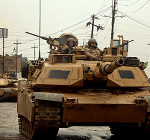Press reports ahead of Prime Minister Modi’s visit suggest that the U.S. will ask India to become a non-NATO ally. Apart from its other downsides, it will immediately put us on par with Pakistan and the reality of hyphenation. The stunned silence which greeted President Obama’s announcement on Syria keeps Secretary of State John Kerry running helter-skelter to garner members for the ‘international coalition.’ Enough reason for India not to succumb to such exhortations.
Syria is the latest in the U.S.’s flawed strategies since the invasion of Iraq in 2003 – it has never looked back and the change of leadership has made little difference. We have had Afghanistan, Libya, and now Syria and the Islamic State. After dithering on any kind of military action, Obama will authorise air strikes against the IS in their safe havens in Syria. The strategy is a major change from that of keeping IS in play to build pressure on Iraqi PM Maliki to quit – a delay that ended up strengthening IS with major field victories in Iraq and Syria.
A number of parallel developments question the credibility and effectiveness of this strategy. On every metric it raises more dangers than suggest a resolution. It is flawed in goal, the manner of execution, target, and the outcome. At its root, IS is a rabid and violent dimension of a major religion, and it is not possible to “degrade” or eliminate an idea by military means.
The strategy is flawed on two other significant counts as well – not seeking any coordination with the Syrian government, and totally bypassing the UN and its Security Council. Under these circumstances, any U.S. action- by air only as we understand will be an invasion of a sovereign country.
Predictably, the Assad regime has said it will be an assault on its sovereignty, unless of course the U.S. coordinates action. But the U.S. prevaricates due to conventional wisdom and Israeli pressure – that it will strengthen the regime against western Sunni proxies and have an adverse impact on Israel’s security. It is still not ready to accept that the Assad regime is the lesser of the two evils and both target a common enemy for the same reason. That the regime has failed for three years is largely due to western assistance. This amounts to saying that it is fine for the U.S. to go after the Sunni ISIS, but not for Assad to, even though it includes his citizens.
So what does this indicate about the UN Charter and the high ideals the U.S. claims to go by? Its studied bypassing of the UN in building the international coalition – of largely the ‘unwilling’ – says enough. Even important NATO members like the United Kingdom are not on board, while others like Germany are evaluating the blow-back of fighting the IS. The U.S. has emasculated the UNSC by ignoring the form of seeking a UN mandate – even though a Russian and Chinese veto is inevitable. By doing so, it has given Russia the opening to do the same in Crimea and Ukraine. The plethora of overt tension in China’s periphery on land and sea now gives the freedom to follow suit.
The response from the Arab and Muslim world has been tepid, even though the Arab League has backed attacks on Syria. The Saudis had no choice but to agree to provide training bases and funding for equipping ‘moderate’ Sunni groups to fight IS. It was the best way to deflect attention from its Wahhabism which spawned this extremist group. It is important to remember that it was the Saudis who funded the ISIS to fight the Shias in Iraq and Syria and bring down the Assad regime. There is no guarantee they will change goal posts, and that this will play out as the U.S. desires.
Finally, there has been no denial of speculation that the IS was created by the West to fight the Shia onslaught from Iran and Iraq. It accords equal blame to both sides of the U.S. political divide. Senator McCain’s meeting with a group of ‘moderate’ Sunni leaders in Erbil on 27 May 2013 substantiates such speculation. Among those in the group he met with was Awwad Ibrahim al-Badri al-Samarrai – the real name of IS head, Caliph Abu Bakr Al-Baghdadi, who, under his earlier handle remains on the U.S.’s List of Specially Designated Global Terrorists with a bounty of $10 million on his head. What was the senator who pillories President Obama doing with a global terrorist?
It is no surprise that the coalition of the unwilling on Syria finds no traction. It is essentially every country for itself. And a first-class disintegration of the huge and expensive structure that is the UN.
International action is needed with the widest consultation amongst countries with composite and diverse populations – who are most at risk from IS’s ideology. That will bring in the widest range of the Islamic population and will ensure that nothing will discredit a religion with one-fifth of the world as adherents. It will ensure that strategies are not put in place based on the narrow divisions in play in West Asia.
PM Modi will do well to distance India from U.S. exhortations on a NATO status, and should perhaps cool the rhetoric for a permanent seat in the Security Council.
Rajendra Abhyankar, former Indian Ambassador to Syria, is now Professor of Practice of Diplomacy and Public Affairs at SPEA, Indiana University, Bloomington.
This article was exclusively written for Gateway House: Indian Council on Global Relations. You can read more exclusive content here.
For interview requests with the author, or for permission to republish, please contact outreach@gatewayhouse.in.
© Copyright 2014 Gateway House: Indian Council on Global Relations. All rights reserved. Any unauthorized copying or reproduction is strictly prohibited.


